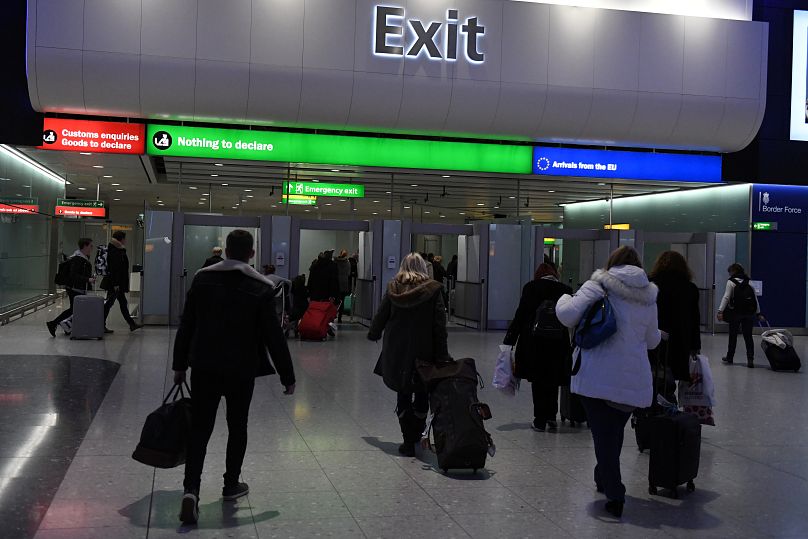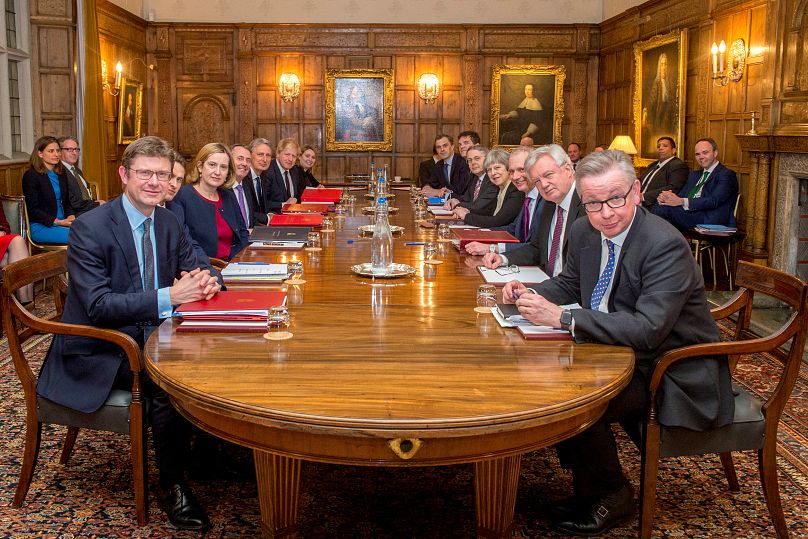Since Theresa May said "Brexit means Brexit" upon becoming prime minister, the UK's planned departure from the EU has spawned a bewildering jungle of jargon. Euronews tries to explain.
In his essay ‘Politics and the English Language’ George Orwell wrote political language "is designed to make lies sound truthful and murder respectable, and to give an appearance of solidity to pure wind." Essentially that it’s purposefully vague and meaningless because it is intended to hide the truth, or in the case of Brexit it often seems like the lack of knowing really what is going on.
Whilst it might at times feel like it’s been going on forever the portmanteau term Brexit was only actually added to the Oxford English Dictionary in 2016, the year the referendum was held.
The OED credits Peter Wilding, founder and director of the British Influence think tank, with first using it in a 2012 tweet, “Unless a clear view is pushed that Britain must lead in Europe at the very least to achieve the completion of the single market then the portmanteau for Greek euro exit might be followed by another sad word, Brexit”.
Since then a whole cacophony of terms and jargon has built up around it, a Lexicon of Brexit – a Brexicon. You might have heard of some of the mainstream ones like Hard Brexit and Single Market Access but here are a few of the more obscure ones in this linguistic quagmire.
1) Brexchosis
In his Valentine’s Day “road to Brexit” speech Foreign Secretary Boris Johnson coined this one when he said “And in the current bout of Brexchosis we are missing the truth: that it is our collective national job now to ensure that when the history books come to be written Brexit will be seen as just the latest way in which the British bucked the trend, and took the initiative”. Translated from BoJo speak it’s a feeling of despair amongst Remainers
2) Brexodus
This week’s latest ONS migration figures revealed the highest number of EU nationals leaving the UK in a decade. In the year to September 2017 130,000 EU citizens emigrated from the UK. During the same period 220,000 EU nationals moved to the UK meaning net migration was 90,000 – the lowest for 5 years.
3) Brexit Cabinet
No not where they keep the spirits to get through the negotiations. This is the sub-committee of the Cabinet which meets regularly to discuss the negotiation progress.
4) “Brexit means breakfast”
A slip of the tongue on the second “Brexit:” often made by politicians making speeches in the morning having evidently missed their Weetabix. Often followed by a lame “I’ll have a full English after” joke attempt.
5) Brino
An abbreviation for “Brexit in name only” invented by Tory backbench MP and ardent Leaver Jacob Rees-Mogg. Last month when discussion of the transition period came to the fore Mr Rees-Mogg said: “If everything is delayed for two years and then there’s high alignment you will find that by 2022 no one will have noticed any difference from having left. Then what will be the point of voting for the party that’s implemented it. I’m against ‘Brino’.”
6) Canada Plus Plus Plus
The trade deal Brexit Secretary David Davis is aiming for with the EU. “What we want is a bespoke outcome. We’ll probably start with the best of Canada, the best of Japan and the best of South Korea and then add to that the bits that are missing which is services. Canada plus plus plus would be one way of putting it” he told the BBC’s Andrew Marr in December 2017.
7) Cliff Edge
A forecast for Brexit before the transition period was agreed; the dream for those wanting a ‘hard Brexit’, perilous for everyone else. Also a site in Dover where in June 2017 a huge cut out of Theresa May dressed in a Ginger Spice-esque Union Jack dress giving the V-Sign towards the continent (in the “up-yours” fashion rather than the peace sign).
8) Customs Union: The Vs. A
A critical differentiation between the definite and indefinite articles; “The” being the current customs union establish by the Treaty of Rome in 1957 that abolishes all tariffs and trade quotas of member stares allowing goods to move freely within the EU. “A” being a proposed new arrangement whereby the UK can enjoy the benefits of “The” Customs Union but also strike it’s own free trade deals with other nations.
9) Regrexit
Coined the day after the 2016 referendum - regretting the decision to vote for Brexit.
10) Red, White and Blue Brexit
Having stuck with “Brexit mean Brexit” sometimes with the addendum “and we’re going to make a success of it” since running for her party leadership Theresa May decided to add some colour on a trip to the Gulf in December 2016. Theresa May who’s a fan of colourful clothes declared, “I’m interested in all these terms that have been identified – hard Brexit, soft Brexit, black Brexit, white Brexit, grey Brexit – and actually what we should be looking for is a red, white and blue Brexit”. Suffice to say the technicolor phrase didn’t catch on…
11) Remoaners
Disparaging term used by Leavers to describe Remainers who continue to argue against Brexit.
12) Three Baskets
Thought to be Theresa May’s preferred option for the UK post Brexit. The country would weave three baskets of regulatory standard for its degree of participation in the Single Marke.t The first being ‘regulatory alignment’, areas in which the UK would want the same regulatory standards at the EU. The next is “regulatory equivalence”, areas where the UK wants similar outcomes but via different rules and regulations. The final basket is “regulatory divergence”, areas the UK wants to adopt different rules and regulations so as to compete with the EU.
13) Vassal State
A country, some argue like Norway which accepts the rules but doesn’t make them, that is in effect a colony but which keeps most of the trappings of its own sovereignty.













